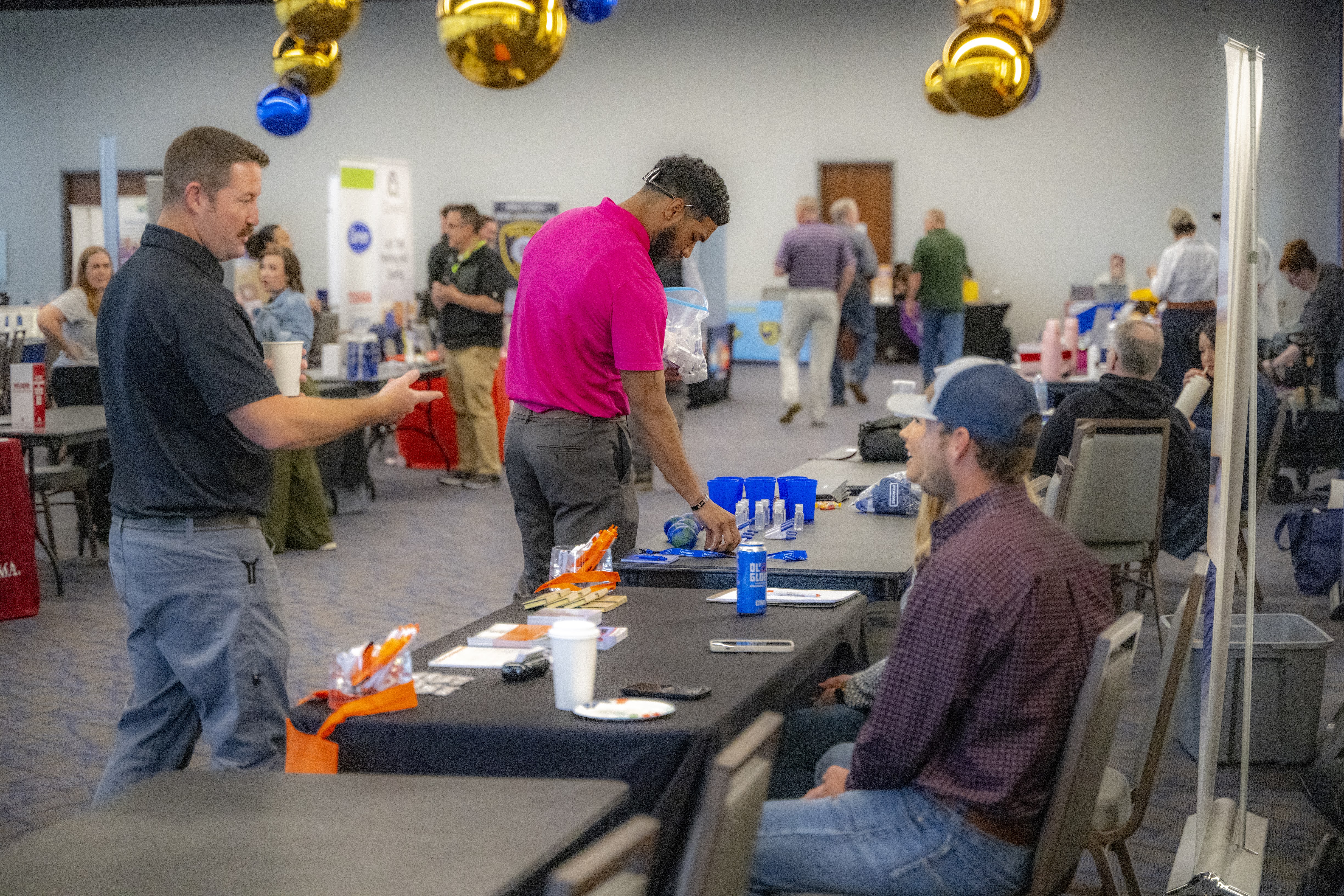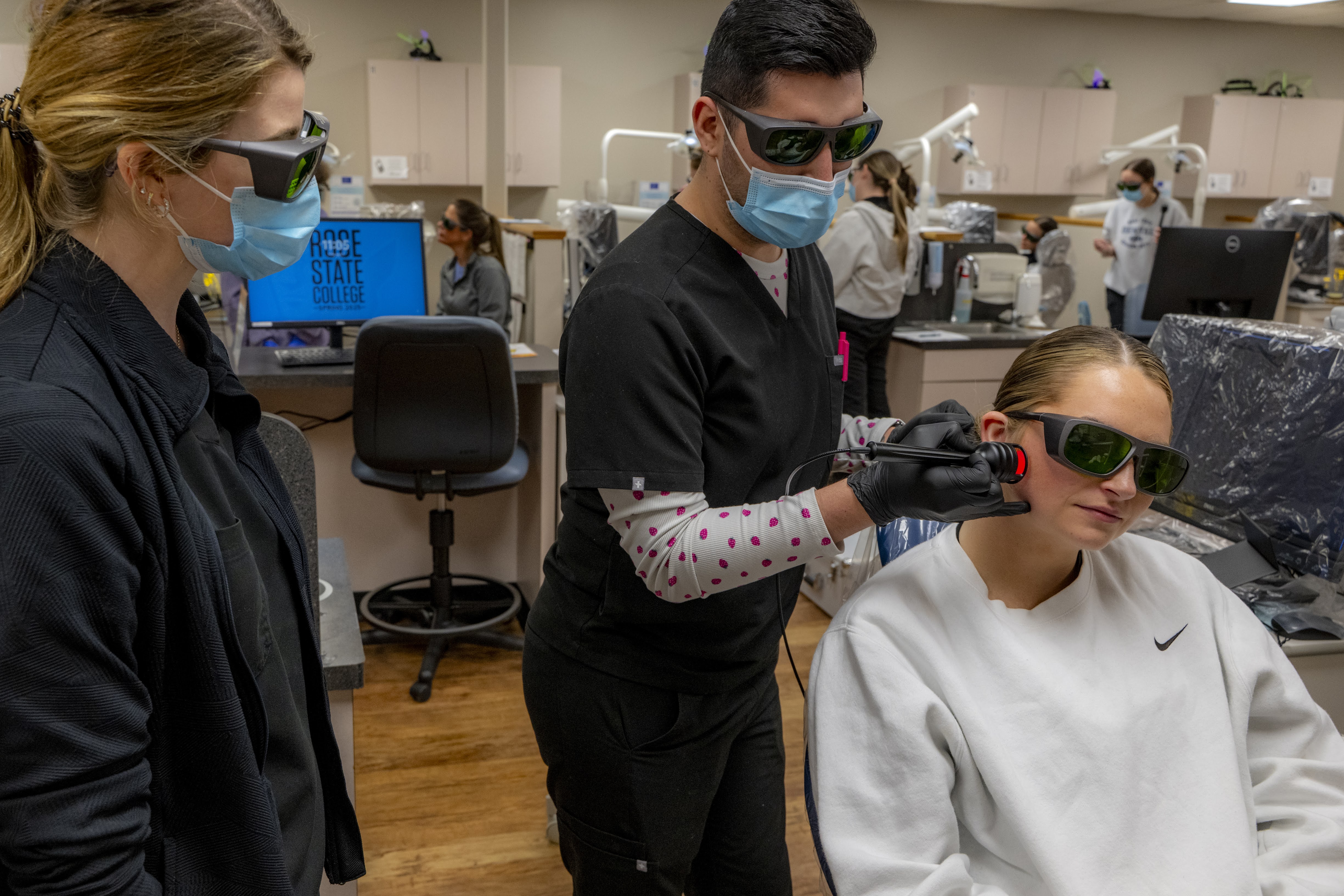Semrad, Darlene
Born: 1921
Date Interviewed: April 2, 2003
Interviewer: Carly Sawyer
Topic: Rosie the Riveter
Q: When and where were you born?
A: Craig, Colorado, 12/13/21.
Q: Where did you attend school and for how long?
A: I attended Central State College. My first two years at Tonkawa Junior College and then I finished there and came on to Central State College. Then I went to OU for my master’s degree.
Q: What were your interests and hobbies as a young woman?
A: I loved the outdoors. We had a lot of cows we had to milk and pigs we had to feed, and then I worked in the harvest field in the summertime by driving a bundle wagon, and I did a lot of shocking of the wheat right out in the nice bright sunlight. I always did like to sew. It has been a hobby all my life, and I still sew and I love it! Of course, I do a lot of volunteer work at my church and several other organizations.
Q: When did you begin to get a sense that the US was headed toward war?
A: Probably about my senior year in high school, and that was at Billings, Oklahoma. Then I went on to college, Tonkawa, and the first year we knew a lot more about it then.
Q: What was your reaction?
A: At that time, I didn’t know too much, because we didn’t have very good communication. We didn’t have communication then like we have now. We hear everything now, but at that time we had the radio and that’s about all.
Q: What was the atmosphere like and the mood of people in the town in which you lived?
A: A lot of kids did not go to college after they finished high school. They wanted to go to work and get married, but my goal was always to continue. I had a brother a little older than I was and he wanted to college, and I wanted to go to college. That’s about all I knew was to go to college.
Q: Were you married at the time? Or seeing anyone on a regular basis?
A: Not at that particular time, no, just had a lot of friends.
Q: When did the government announce that the women were going to be brought into the defense industry?
A: I really don’t know, because when I finished my bachelor’s degree at Central State, I applied for a job and I just got right on, so I’m not sure what year they really started. That was in about 1944, I believe.
Q: What was your reaction at the time?
A: I worked my way through school and was just finished school. Of course, to have a job sounded great to me.
Q: When did you decide to become a so-called “Rosie the Riveter,” or work in the war effort?
A: Just after I finished college, I needed a job and I put my application in a few weeks before that, and just after I got out of school I was notified that I could go to work. I was thrilled!
Q: How did the people close to you react to your decision?
A: They were glad that I had a job. They didn’t mind it at all!
Q: Did you know a lot of other women in your area that were also going to become involved in defense industry work?
A: No, not really. I had a friend or two that wanted to go to work, then a little bit later I had a younger sister that also went to work in the same area, but different position. That’s about all I knew at that time.
Q: How did the process unfold as you went from civilian to defense industry worker?
A: The main thing was I had to have a ride back and forth. I took bus, transferred, and then after that I rode in a car pool, so it really wasn’t a problem.
Q: What kind of job or jobs did you work? What were you responsible for?
A: I worked in almost the beginning part of the joining the two tail sections together – the top and the bottom. Some of that work had already been done, and then right on down the jig, and that’s where I started. Then I started riveting, which was a new job to me. It was fun! I worked on the tail section, joined the top part of just that section together.
Q: How many hours per day did you work and how many days per week did you work?
A: We worked seven days a week and I think it was just eight hours a day. I worked in the evening shift, starting at 3:00 and worked until 11:00, or perhaps until 12:00 and had an hour off for lunch and breaks.
Q: What kind of pay did you receive?
A: I received $.65 an hour and I was thrilled! I know that doesn’t compare to today’s work, but I thought $.65 was great!
Q: How long did your employment last?
A: It didn’t last but about a year because the end of the war was declared. Then after that, of course I had my college degree, and went right into the school system at Hunter, Oklahoma. I taught the upper grades.
Q: Did you want to quit?
A: Not really, but we were all dismissed. But I could work on my education, which I did.
Q: What was the mood of your fellow female workers?
A: Some of them were glad to get out of work and do something different. Part of them were probably getting married or whatever. Most of us enjoyed what we were doing. I did.
Q: Was there a sense of camaraderie among the female workers? Did you make any lifelong friends?
A: No, I didn’t because they came from all different section so of the country. There were several good friends that I kept up with several years, but then I don’t any more.
Q: Did the women enjoy the work, or did the work prove too difficult for some of the women?
A: What we were doing, it wasn’t hard, it was just continuous, and we really had to think about what we were doing or we would have blown a hole through the metal of the plane, which I think was aluminum. I was on the outside of the tail section and a man was on the inside. He had what was called a buck bar. He held that up against the seam and I was on the outside with a riveter, or pressure gun, and I’d poke the rivets in the little holes, then hit it with the gun, and the guy on the inside would have his bar up against it to smash it down flat. That was the fun part – to see how fast you could go and if he could keep up with me! He did and we went real fast. We were real good partners for a long time there.
Q: Did you notice any of the other women having problems there?
A: Well, not really. There wasn’t too many women. The men did the heavier part, and what we worked on was all put on a jig and so that was all taken care of before I did my chore.
Q: Were the women from every kind of economic, ethnic, racial, and social background?
A: There were some in there that were older than I was. I did not see any black people in there at that time. I don’t imagine there were over three or four women in my section. We were always real good friends to each other. I didn’t recognize any particular problems.
Q: What was the reaction of the fellow male workers?
A: They were quite courteous. I had nice people to work with.
Q: They didn’t have any problems with women coming in to work?
A: No, I don’t think so. There were one or two guys that were just a little bit flirty, which the women did not care for, but they didn’t stay too long. They kind of moved on when I think they recognized they weren’t too welcome with their behavior.
Q: How were you treated by them, as well as by the bosses who were in charge?
A: The men all treated us quite well. The bosses were real good. They were fair. We had to check in and check out on the time sheet and it was always accurate as I can remember.
Q: Did the women get the same pay as men?
A: I really don’t remember that, because I really probably didn’t know what they made. They probably didn’t share that information with us if they got more!
Q: What was the overall atmosphere at Tinker Air Force Base and the surrounding area?
A: I think everybody was just thrilled to be working. Of course, they were always ready to check out, but the atmosphere was a position we knew we were helping the war effort. I was glad I could do that.
Q: Was there any fears of anything going wrong?
A: I don’t know that there were any fears, I certainly didn’t have any. I just took it as a job and just glad to do it.
Q: What kinds of memorable occurrences did you witness or experience?
A: We didn’t have anything unusual. We just did our jobs. I know several times I worked overtime on a much larger plane. I did about the same thing – there might have been some patches made on the fuselage that needed to be mended and I would help do that. That’s about the only thing different I did.
Q: After the war, was there any kind of pressure from the government and the media for women to leave the workplace and return to the home so that male veterans could once again have access to jobs?
A: When the war was declared [over], the majority of the people was dismissed at that time. The follow through on the males working afterwards, I do not know, because I moved to a different area of the state.
Q: When the war was over, did you quit working?
A: After that it was my first year of teaching.
Q: How do you think the war years impacted the lives of women in this country?
A: I imagine for those people who were married it was much harder on them than it was me because I was single at that time. I do not remember any of the women that had anybody close to them in the war because I don’t remember ever talking about it.
Q: Was it something that you tried to stay away from?
A: I imagine so. We were pretty busy most of the time. We didn’t do a lot of talking.
Q: After the war was over, did you notice any women acting different, or having a different attitude about life or different things?
A: Well, I can’t say that they did. Right after the war, I was living in Edmond at that time in an apartment. Right after the war I was given this position, so I didn’t stay around the people that I worked with very long. I just don’t remember any of them making many comments about this.
Q: What impact did the working women of World War II and their experiences have on future generations of American women?
A: I think it was very excellent experience to know that we helped in the process of making the planes for the war. I’ve always remembered it as a great experience.
Q: How do you think that would affect someone from my generation?
A: There are a lot of years between my generation and the present-day generation. I know my daughters both went to OSU and stayed until they got their master’s degrees, but then went right into teaching. Other types of jobs, I’m sorry, I just can’t give an opinion.
Q: Did the skills you learned during the war serve you in any kind of way in the subsequent years after the war?
A: Probably, I learned how to be to work on time – that’s a simple one. I was just always there. I didn’t take any absences. And I still didn’t take any absences when I was teaching school afterwards. I guess it was a thing I grew up with. Attendance meant a lot.
Q: What things stand out most in regard to your experience as a Rosie the Riveter or any of the other kinds of work you did during World War II?
A: Probably learning how to use a rivet gun, which was quite fascinating. And we learned how to drill with an electric drill, and how to change the different bits and different sizes. That was outstanding! I still use the drill, but I don’t have a riveter! Things like that probably stand out.
Q: What kind of lessons did you learn?
A: I knew I had to be on the job because I didn’t want to lose my job, and I knew that being present and on time meant a lot to the company. We just learned to do our work and that was it.
Q: If you would like to discuss or expand on anything at this time, please feel free to do so. Would you like to add anything?
A: I think it was a great honor to get to be an employee in industry. Of course, being a riveter, I enjoyed very much. I have attended several organizational meetings afterward – two or three, I guess. The last time I got to go through the whole plant, which was so fantastic, and it had changed so much in those years that I hadn’t been out there. We went on kind of a trolley-wagon type thing and I thoroughly enjoyed that experience and thought it was a privilege. That was the greatest thing, I guess, just going back.
Q: In what ways has it changed?
A: Oh, so many of the big jigs and the different areas – when we were there we were building the airplanes and that section was all changed. Of course, a lot of new sections were added, but it was interesting. I thoroughly enjoyed going through it.
Q: Do you think that from the World War II experiences of Rosie the Riveters doors were opened, or do you think they would have opened on their own without the war?
A: Well, I’m sure it opened doors for a lot of people who needed a job. I hope from there it opened their future for them. I had my education to fall back on. A lot of people did not, so that was probably a good experience for them.



